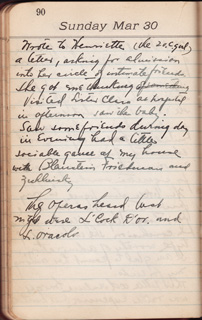
Sister Clara gave birth to a
baby boy at 10:05 P.M.
This was a complete surprise
as I did not expect her to
give birth now.
I cabled immediately
the news to my parents.
————
Matt’s Notes
When I first transcribed this entry and the words “this was a complete surprise…” I thought Papa meant he was surprised that Clara gave birth in the first place, not that he was surprised by how early she gave birth. I wondered, with a jolt, how Clara could have been pregnant for so long without Papa knowing about it, whether the baby was unusually tiny, or if Clara was somehow ashamed and hiding her pregnancy like the high school girls you sometimes hear about who give birth at the prom. This misunderstanding cleared up milliseconds later as I transcribed the words “I did not expect her to give birth now,” but for some reason the first words of this entry still have a trace of the same effect on me when I reread them.
Maybe I secretly want Papa to have not realized Clara was pregnant until her baby suddenly appeared because it would be a funnier story, or maybe his own surprise and excitement made its way to the page in the form of a surprisingly-worded sentence (then again, I may be the only one who’s thrown by this passage; if any of my legions of readers experienced the same thing, please let me know). Perhaps Papa penned this entry, still breathless, after dashing home from the Western Union office (an overseas telegraph message must have been quite a splurge) though his handwriting doesn’t seem hurried or shaky. Anyhow, the baby in question is my cousin Julius (a.k.a. Julie) with whom I recently been in touch. Stay tuned for anecdotes.

 This day will long be remembered
This day will long be remembered



